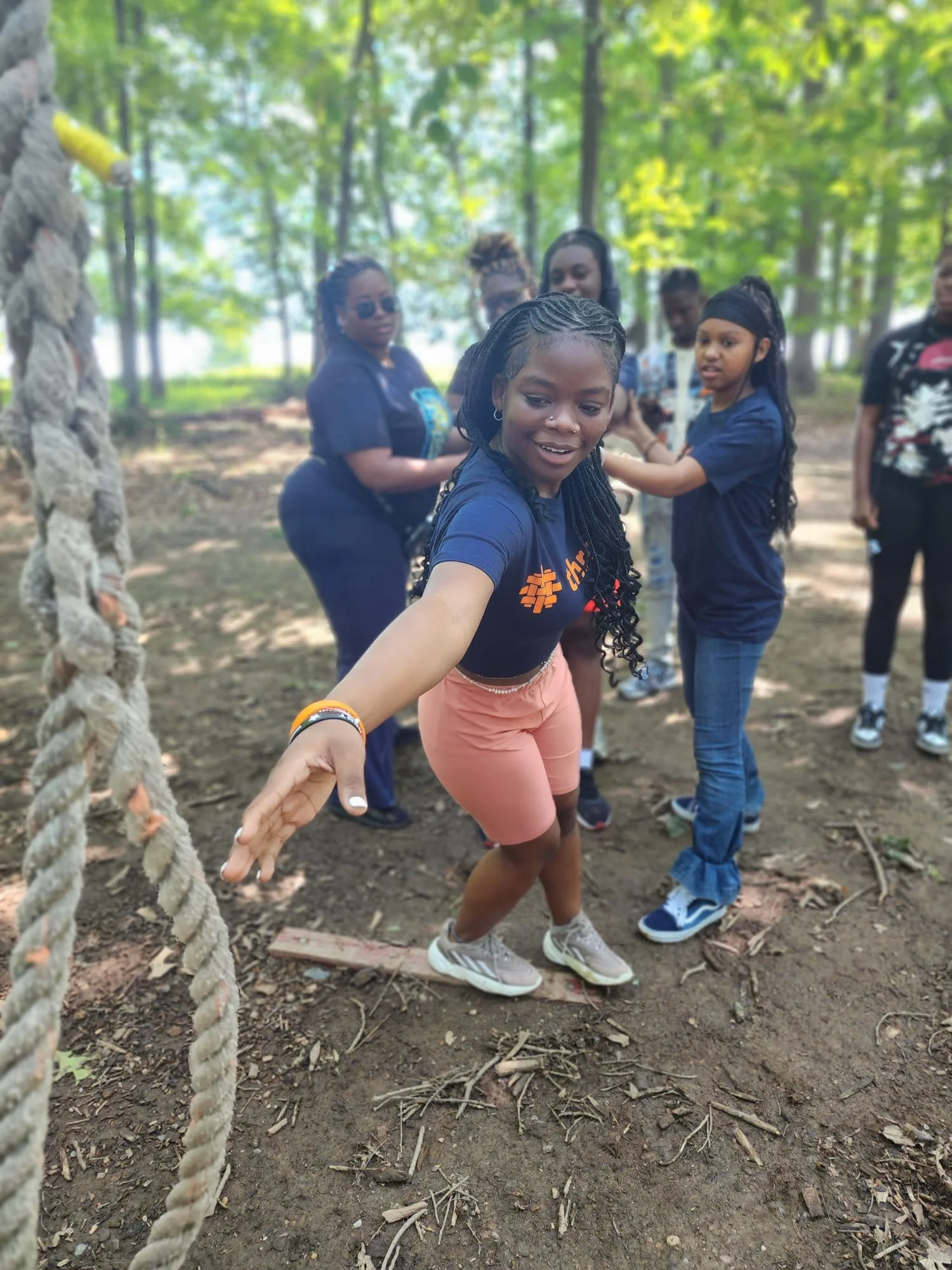The Forest as a Forum: Mentoring in Nature’s Classroom
By Dr. Kristin Johnson, Ed.D
Thread participant reaches out for the rope to help them cross to the magical island!
In a culture saturated with screens, stress, and systemic barriers, the need for meaningful human connection has never been more urgent—especially for youth navigating complex environments. Mentorship, when done well, offers more than advice. It offers belonging. And when mentorship is paired with the natural world, that belonging deepens in powerful, lasting ways.
🧭Why Mentorship Matters
Decades of research show that consistent, supportive mentorship leads to life-changing outcomes for young people—boosting academic achievement, fostering resilience, improving mental health, and reducing the likelihood of risky behavior (Rhodes, 2005). These benefits are especially profound in marginalized communities, where stable, caring relationships can provide critical support and a sense of belonging.
More recent findings offer an essential insight: where mentorship takes place matters just as much as how it happens. Organizations like Thread, The Trippley Foundation, Youth Advocate Programs (YAP), and Upward Bound exemplify this principle through relationship-based, mission-driven models.
Thread weaves a new social fabric by connecting underperforming high school students with committed university and community volunteers, building a culture of accountability, trust, and care.
The Trippley Foundation supports grieving youth and families through leadership development and civic engagement, helping them heal and thrive after loss.
YAP keeps youth anchored in their communities by offering alternatives to incarceration, centering care around families and individual strengths.
Upward Bound prepares first-generation and low-income students for postsecondary success through academic support and personal development.
Together, these programs remind us that mentorship grounded in consistency, care, and context has the power to change a young person’s path—and open new possibilities for growth.
🌱Mentorship Without Walls
At Genesee Valley Outdoor Learning Center, mentorship happens beyond four walls—it happens under trees, along trails, and while catching fish in the quiet lakes. Here, nature is more than a backdrop; it’s a catalyst for connection. In the woods, away from digital distractions and the pressure to perform, youth and mentors are more likely to drop their guard, engage authentically, and build trust through shared experience.
Research in environmental psychology and youth development supports this approach: time spent in natural spaces reduces stress, supports emotional regulation, and deepens relational connection (Berman, Jonides, & Kaplan, 2008). These settings activate the brain’s default mode network—associated with empathy, reflection, and creativity—laying the groundwork for meaningful mentoring relationships to take root (Bratman et al., 2015).
Whether navigating a ropes course, walking side by side on a trail, or quietly reflecting by a stream, these moments in nature invite presence. They shift mentorship from transactional to transformational—from checking boxes to building trust. Unlike traditional mentoring environments that can feel formal or hierarchical, the outdoors levels the playing field. There are no desks or screens between mentor and mentee—just curiosity, challenge, and connection.
🌳Bridging the Gap Between Nature and the Workplace
Mentorship isn’t just vital for youth—it’s a cornerstone of thriving workplaces. According to the Harvard Business Review, strong mentoring relationships lead to higher job satisfaction, stronger retention, and accelerated leadership development. But these outcomes depend not just on having mentorship programs, but on how and where those relationships unfold.
Nature-based mentoring models, like those practiced at Genesee Valley, offer insights that translate powerfully into professional environments. Shared outdoor experiences foster psychological safety, empathy, and vulnerability—all foundational for innovation and effective leadership (Edmondson, 1999; Brown, Ryan & Creswell, 2007). Rather than relying solely on structured evaluations or formal meetings, these models emphasize presence, listening, and inquiry—skills that build cohesive, resilient teams.
In a time when organizations are rethinking connection and culture, the woods offer more than metaphors—they provide a blueprint. When mentorship is grounded in trust, presence, and shared humanity, it becomes a powerful pathway to transformation.
Stay connected for more in this series as we explore the powerful connection between nature and the development of executive functioning skills.
Sources
Berman, M. G., Jonides, J., & Kaplan, S. (2008). The cognitive benefits of interacting with nature. Psychological Science, 19(12), 1207–1212. https://doi.org/10.1111/j.1467-9280.2008.02225.x
Bratman, G. N., Hamilton, J. P., Hahn, K. S., Daily, G. C., & Gross, J. J. (2015). Nature experience reduces rumination and subgenual prefrontal cortex activation. Proceedings of the National Academy of Sciences, 112(28), 8567–8572. https://doi.org/10.1073/pnas.1510459112
Brown, K. W., Ryan, R. M., & Creswell, J. D. (2007). Mindfulness: Theoretical foundations and evidence for its salutary effects. Psychological Inquiry, 18(4), 211–237. https://doi.org/10.1080/10478400701598298
Edmondson, A. (1999). Psychological safety and learning behavior in work teams. Administrative Science Quarterly, 44(2), 350–383. https://doi.org/10.2307/2666999
Genesee Valley Outdoor Learning Center. (n.d.). About Us. Retrieved July 6, 2025, from https://www.geneseevalley.org/about
Rhodes, J. E. (2005). A model of youth mentoring. In D. L. DuBois & M. J. Karcher (Eds.), Handbook of youth mentoring (pp. 30–43). Sage Publications.
Thread. (n.d.). What We Do. Retrieved July 6, 2025, from https://www.thread.org/what-we-do/thread.org+5thread.org+5thread.org+5
U.S. Department of Education. (n.d.). Upward Bound Program. Retrieved July 6, 2025, from https://www.ed.gov/grants-and-programs/grants-higher-education/federal-trio-programs/upward-bound-programed.gov+4ed.gov+4ed.gov+4
William Trippley Youth Development Foundation. (n.d.). About Us. Retrieved July 6, 2025, from https://www.willtrippley.org/home-camps
Youth Advocate Programs (YAP), Inc. (n.d.). Direct Services. Retrieved July 6, 2025, from https://www.yapinc.org/What-We-Do/Direct-Servicesyapinc.org

